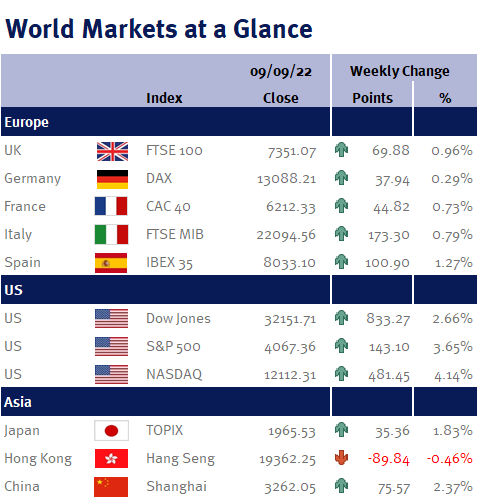This is because the government expects the measures to reduce inflation by up to 5% – and this will result in a massive saving to the government by reducing index-linked debt costs and welfare payments.
Additionally, we should also all benefit from the fact that some of our household bills which are linked to inflation (such as our mobile phone and internet contracts) won’t rise as much as we previously expected; and furthermore, a lower inflation rate should also help to persuade BoE policymakers that an aggressive increase in UK interest rates is not actually needed.
Elsewhere, as expected the ECB not only joined the trend for large interest rate increases, with a 0.75% increase in Eurozone interest rates to 0.75%, but policymakers also indicated that there would be further increases to come to reduce inflation.
The ECB also revised its economic growth and inflation forecasts. The ECB’s new inflation projections suggest inflation will end this year at 8.1%; 2023 at 5.5%; and 2024 at 2.3%.
However, what was surprising given the increase in Eurozone interest rates, coupled with how much gas prices have increased (not to mention all the talk of potential winter shortages and blackouts), the ECB increased (yes, increased) its economic growth estimates for 2022 to 3.1% from 2.8%. This simply reaffirms our opinion that central bank policymakers are completely disconnected with the real world!
Thankfully, as you can see from the accompanying table, none of the week’s events stopped global equity markets from ending the week nicely higher.
Looking ahead to the coming week, in the UK there will be 10 days of national mourning, meaning that Liz Truss will not be making any government announcements during that time and we will have to wait even longer to find out what the new Chancellor of the Exchequer, Kwasi Kwarteng plans for our finances.
Although UK economic data releases will continue to be published as usual next week (the main highlights of which are GDP for July; industrial production; employment data; CPI inflation; and retail sales), the BoE has deferred its monetary policy meeting by one week to 22 September 2022.
However, the week’s most important data release for global financial markets will be Tuesday’s (13 September 2022) US CPI inflation – especially as Fed policymakers will not be able to pass any comment given they will be in their ‘blackout’ period ahead of their monetary policy meeting the following week (Wednesday 21 September 2022).
Additionally from the US, we have retail sales; the Empire State Manufacturing Survey; and the University of Michigan Consumer Sentiment Index.
Elsewhere, we have Eurozone and Chinese industrial production and Chinese retail sales.
Investment Management Team


